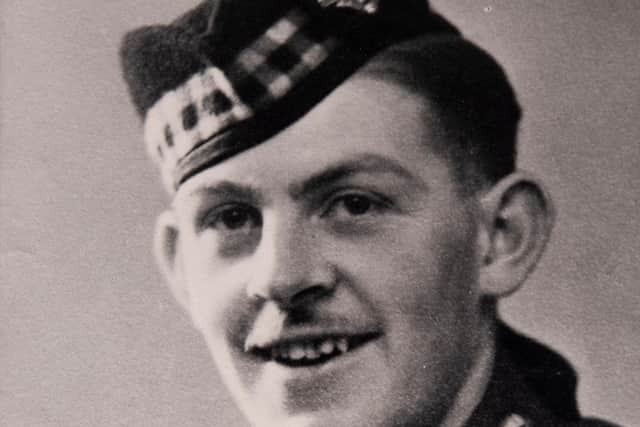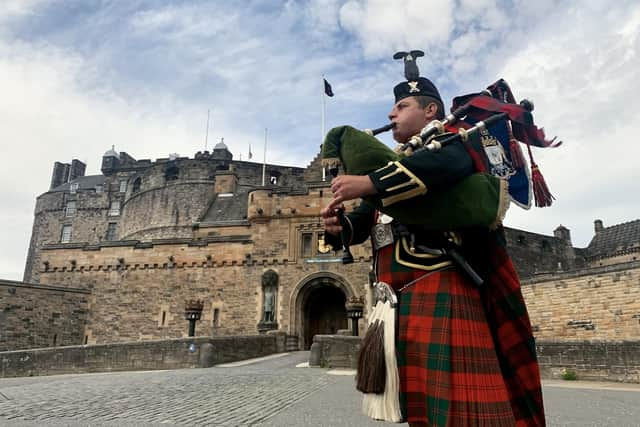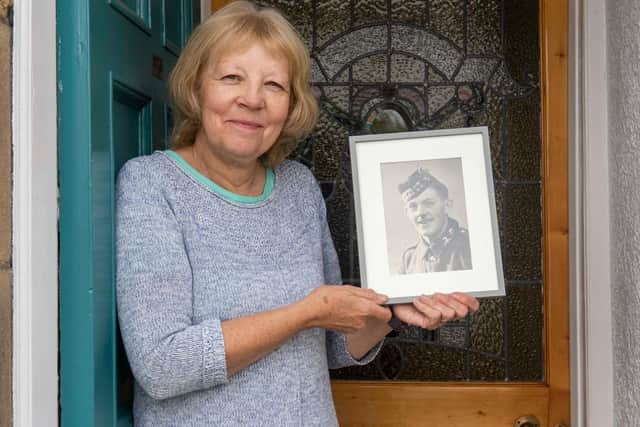Daughter's poignant tribute to father who fought at St Valery and escaped a PoW camp in dead of night
On Diane Chisholm’s doorstep in Edinburgh yesterday, a neighbour and piper played The Heroes of St Valery at 10 am to honour those Scots soldiers who were captured following the British Army surrender in the French port town 80 years ago, on June 12 1940.
Ms Chisholm’s father, Lance Corporal Colin Chisholm, a Seaforth Highlander who served in the 4th batallion of the 51st Highland Division, was among them.


Advertisement
Hide AdAdvertisement
Hide AdThe lament was played simultaneously by hundreds of pipers around the world with the commemoration led by the Duke of Rothesay at Birkhall, his home on the Balmoral Estate. At Edinburgh Castle too, the tune held the air.
For Ms Chisholm, a retired teacher of Restalrig Avenue, yesterday’s commemoration for the men left behind in France following the evacuation of Dunkirk just over a week earlier was a long time coming.
Ms Chisholm said: “My dad was a very mild-mannered man but what did irk him was that Dunkirk was always commemorated but nothing was said about what they went through at St Valery. ‘Why does not one mention it?’ was his his view. He was a bit miffed about that. They were left to fight Rommel’s Panzer Division.
“Not a lot of people seem to know about the men who were left, the men who were still fighting. Churchill could paint Dunkirk as a success, but my suspicion was he wanted to bury the surrender at St Valery as bad news.”


The 51st Division had become separated from the rest of the British Expeditionary Force who made it out of France and, as they spent the next week or so trying to reach the coast, became surrounded by German tanks on the cliffs at St Valery-en-Creux.
An evacuation was planned, but fog and poor communication hampered the rescue and on June 12, Major General Sir Victor Fortune followed the French and surrendered.
Ms Chisholm added: “On the day their commanding officer told them to lay down their rifles, Dad said the men very much felt ‘we haven’t come all this way to surrender. They had been fighting since May and were exhausted. When they were told to surrender, the soldiers were crying.”
Following the surrender, LCpl Chisholm, a farmer’s son originally from Strathpeffer who joined the Territorial Army aged 22, was taken to StalagVIII-B Prisoner of War Camp where he spent almost five years digging roads and canals.


Advertisement
Hide AdAdvertisement
Hide AdMs Chisholm said: “It was filtering through to the PoW camp that the British and Americans were advancing . Dad said they were already hearing aircraft above and his view was that he hadn’t survived more than four -and-a-half years in there to now be blown up by the Americans.
“He decided he wanted to get out and said ‘who is coming with me’. A young Irish lad said he wanted to go too. I am guessing at the end of the working day they managed to somehow slip the guard. They travelled by night and eat turnips out the field.
Ms Chisholm said her father and his companion gave themselves up to the first Allied command they came across. While the British wanted to send him back to the front line, it was the Americans who sent them home.
The young soldier was back on the family farm before the end of the war and, after demobolisation, moved to Edinburgh to join the Fire Brigade.
He served as a city fireman for 25 years and lived with his wife, Marjorie, of Leith, a motorbike dispatch rider for the Fire Service during the war, with the couple living in McDonald Road for many years.
Ms Chisholm added: “The fact that he wanted to escape says a lot about my dad.
“The fact that he didn’t moan about it also says a lot about him. He had a lot of resillience which I feel he has passed down through his family.”
She added, however, that as children they would never be allowed to leave any food and that her dad would never let even the smallest piece of soap go to waste.
Advertisement
Hide AdAdvertisement
Hide Ad“You take soap for granted and me and my sister used to laugh about it but my dad would never throw the end of a bar of soap away. He would collect up all the ends and boil them up all together on a primus stove to make a new piece. It was things that he didn’t have during the war that very much mattered to him.”
A message from the Editor:
Thank you for reading this story on our website. While I have your attention, I also have an important request to make of you.With the coronavirus lockdown having a major impact on many of our advertisers - and consequently the revenue we receive - we are more reliant than ever on you taking out a digital subscription.Subscribe to scotsman.com and enjoy unlimited access to Scottish news and information online and on our app. With a digital subscription, you can read more than 5 articles, see fewer ads, enjoy faster load times, and get access to exclusive newsletters and content. Visit https://www.scotsman.com/subscriptions now to sign up.
Our journalism costs money and we rely on advertising, print and digital revenues to help to support them. By supporting us, we are able to support you in providing trusted, fact-checked content for this website.
Joy Yates
Editorial Director